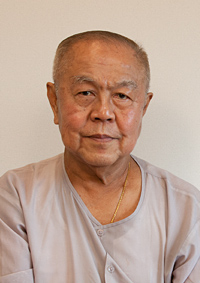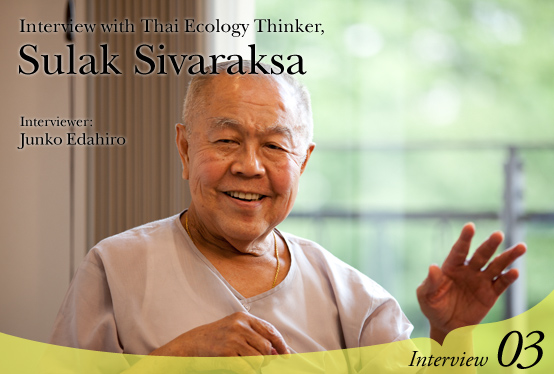- Junko :
- Right. This is going to be the last question to you. In the beginning, you said that even in the Western world, you can see hope. So where can we see hope? How can we foster this hope to actually see change for better?
- Sulak :
- Yes. Try to look beyond the mainstream. Don't be attached too much to the mainstream mass media. Don't be attached too much to mainstream education. There is now alternative education. People like Amartya Sen have received the Nobel Prize for Economics, who said clearly that the mainstream economy will rule the world. Now people are promoting a Buddhism economy. A Buddhism economy means that people matter, nature matters, not capital. Tremendous.
- I heard young Americans are now becoming more and more non-violent. I can vouch for that. Young Americans 16 and 20 years old now have time for meditation. In Europe, you also see that. In Japan you look to the West so much. Why don't the young people look to the young Americans and Europeans and do some mediation?
- They don't have to go to the Buddhist temple, and don't have to be a Buddhist. This breathing will change them. And then go to the poor. Learn from the poor. I think that is the answer.
- Junko :
- Are you optimistic about the situation?
- Sulak :
- No, I am not optimistic, but I am hopeful.
- Optimistic means that everything will be wonderful, but hopeful means that there are signs of change. Even in my own country, there is so much fighting. The economic situation is bad, and we've gotten full of pollution. People back home are in slums. The media is awful.
- But the young people are trying to be spiritual. Even mainstream universities offer to help them. One university added a school of well-being in collaboration with Bhutan Study Center promoting Gross National Happiness.
- Junko :
- Amazing.
- Sulak :
- Tremendous. And at the World Economic Forum in Davos, Switzerland last year, a French Buddhist monk was invited to talk about Gross National Happiness. So they realize that the mainstream is coming to an end. They look for something alternative. Even the French President is looking for an indicator of Gross National Happiness.
- My book, which just appeared earlier this year in England, was reviewed by the "Independent," the most well-known newspaper in England. In the first line, the article said, "Breathe in calmly, breathe out mindfully. Drop Pepsi-cola." And the second line said, "Prime Minister David Cameron should read this book." People are taking this book seriously now. So I think there is hope.
- Junko :
- Yes, there is hope.
- Sulak :
- This book may not be that hope, but one of the contributions towards the twenty-first century.
- Junko :
- Exactly. Yes, this is the source of hope. Thank you very much for your time. I really enjoyed talking with you.
- Sulak :
- Thank you.
Sulak Sivaraksa

Born 1933, Sulak Sivaraksa is a prominent and outspoken Thai intellectual. A social critic, scholar, publisher and activist, since the late 1960s, he has been involved in many rural development projects and has established numerous NGOs and social projects together with Buddhist monks and the student activists, in the spirit of community service. He has published over 100 books and papers in Thai and English, including Seeds of Peace: A Buddhist Vision for Renewing Society and Conflict, Culture, Change: Engaged Buddhism in a Globalizing World. In 1995 he was awarded the Right Livelihood Award, also known as the Alternative Nobel Prize. In 2011, he received the 28th Niwano Peace Prize.





